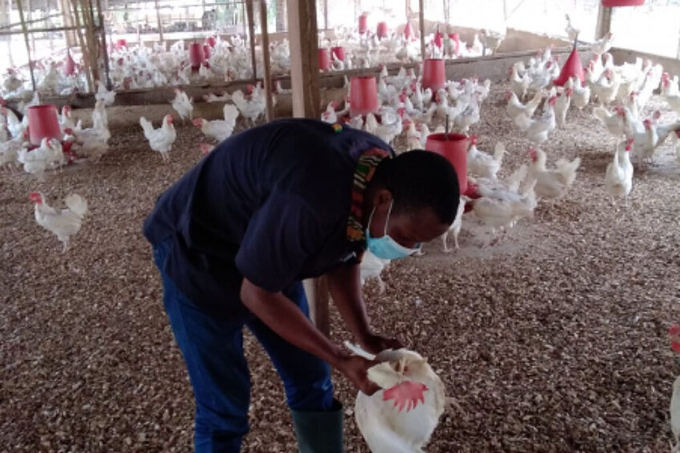June 21, 2025 | 01:13 GMT +7
June 21, 2025 | 01:13 GMT +7
Hotline: 0913.378.918
June 21, 2025 | 01:13 GMT +7
Hotline: 0913.378.918

Photo: Paul Atsu2323, Food and Agriculture Organization of the United Nations, 2020. Reproduced with permission
Cheap imports of chicken – mainly coming from the European Union and to a lesser extent from the USA and Brazil – have increased rapidly over the last 20 years, receiving a lot of attention in public debates about trade liberalisation, food security, and poverty. On the one hand, developing countries may benefit from cheap imports, which help to keep domestic prices low and thus improve poor people’s access to nutritious foods. On the other hand, cheap imports of chicken have long been criticised for hurting the local poultry production sector, including smallholder farmers.
“The topic is much discussed when it comes to poverty, international trade and Europe’s role in the agricultural sector in Africa,” says Prof Dr Matin Qaim of the Center for Development Research at the University of Bonn.
In Ghana, chicken meat is popular, and consumption levels are rising steadily. Nevertheless, with an average annual consumption of 9 kg per capita in 2019, consumption levels remain below the worldwide average. Imports now account for 3-quarters of the total poultry meat supply in the country.
A tariff increase or an out-right ban
Researchers at the University of Bonn and the University of Göttingen used the example of Ghana to calculate and better understand what would happen if the African country were to significantly increase import tariffs (50%) for poultry meat, or to even stop poultry meat imports altogether.
Qaim and his team report that in their study, they used nationally representative data from about 14,000 households in all regions of Ghana. They combined this data of production and consumption with a trade model. “Such a combination of micro and macro data has not been used before to study the effects of poultry imports on different populations in West African countries,” says Qaim, adding that previous case studies focused primarily on poultry producers.
The knock-on effect
Should Ghana significantly increase its import tariffs for poultry meat, domestic prices would rise. If imports were stopped altogether, local producers would get over a third more for selling their chicken. However, the researchers note that according to insights, most households in Ghana would not benefit because prices for consumers would also increase. “And there are significantly more consumers than poultry producers,” explains lead author Isabel Knößlsdorfer of the University of Göttingen.
On the producer side, the researchers note that another factor is that many smallholder households produce poultry primarily for their own consumption, so they are less affected by prices.
Speaking about “poor and less poor households” in urban and rural areas, Knößlsdorfer said: “We show that all of these groups would be worse off on average without poultry imports than with the imports. Poor households would eat 80% less chicken if imports were stopped.”
Demand for poultry meat is rising sharply in many African countries and cannot be met by domestic production alone, she explained, noting that these basic findings can also be applied to other importing countries in West Africa, adding, “Our results show that international agricultural trade can have important positive development effects for West Africa.”
EU and Africa have totally different dynamics
“A reduction in meat consumption in Europe would be entirely desirable for sustainability reasons, but in Africa, the situation is different. Meat consumption is still very low in most African countries, so the cheap availability through imports improves the local supply and nutrition situation with proteins and other important nutrients,” says Qaim, who is also a member of the University of Bonn’s Transdisciplinary Research Area ‘Sustainable Futures’ and Cluster of Excellence PhenoRob.
“Of course, local agriculture in Africa also needs to be strengthened and promoted. However, striving for local self-sufficiency does not make sense for all products,” Qaim says.
(Poultryworld)

(VAN) Poultry production in Poland, which has only started recovering from devastating bird flu outbreaks earlier this year, has been hit by a series of outbreaks of Newcastle disease, with the veterinary situation deteriorating rapidly.

(VAN) Extensive licensing requirements raise concerns about intellectual property theft.

(VAN) As of Friday, a salmonella outbreak linked to a California egg producer had sickened at least 79 people. Of the infected people, 21 hospitalizations were reported, U.S. health officials said.

(VAN) With the war ongoing, many Ukrainian farmers and rural farming families face limited access to their land due to mines and lack the financial resources to purchase needed agricultural inputs.

(VAN) Vikas Rambal has quietly built a $5 billion business empire in manufacturing, property and solar, and catapulted onto the Rich List.

(VAN) Available cropland now at less than five percent, according to latest geospatial assessment from FAO and UNOSAT.

(VAN) Alt Carbon has raised $12 million in a seed round as it plans to scale its carbon dioxide removal work in the South Asian nation.